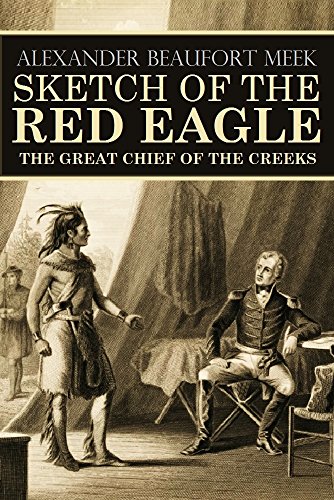Sketch of The Red Eagle, the Great Chief of the Creeks in the War Against General Jackson (1857)
(Alexander Beaufort Meek (1814--1865) was Alabama's Attorn...)
Alexander Beaufort Meek (1814--1865) was Alabama's Attorney General, lawyer, judge, and historical writer, who in 1857 published a collection of historical sketches titled: "ROMANTIC PASSAGES IN SOUTHWESTERN HISTORY." Included in this collection was a short 15-page sketch of "The Red Eagle, the Great Chief of the Creeks in the War Against General Jackson"---which sketch has been reprinted here for the convenience of the reader.
William Weatherford, also known as Lamochattee (Red Eagle) (c. 1780--1824), was a Creek chief of the Upper Creek towns who led the Red Sticks' offensive in the Creek War (1813–1814) against the United States. Major General Andrew Jackson led a combined army of state militia from Tennessee, Georgia, and Alabama. Jackson's army finally isolated the main Red Stick Army along with hundreds of American hostages. Red Eagle played a decisive role in rallying his forces and trying to save the hostages from death. In the finale of the Battle of Horseshoe Bend, Red Eagle’s rapid responses allowed various small bands of Red Sticks to regroup and fight a rear guard action, but the remainder of the Red Sticks were destroyed.
One of many mixed-race descendants of Southeast Indians who intermarried with European traders and later colonial settlers, William Weatherford was of mixed Creek, French and Scots ancestry. He was raised as a Creek in the matrilineal nation and achieved his power in it, through his mother's prominent Wind Clan, as well as his father's trading connections. Weatherford negotiated a new peace through a new treaty with the US; although he had to accept a permanent reduction in Creek territory, he gained retention of most of their territory, including areas where they had homes. After the war, he rebuilt his wealth as a slaveholding planter in lower Monroe County, Alabama.
Meek writes:
"As he grew to manhood, the wars of his people with the Chickasaws and Choctaws, and sanguinary excursions to the frontiers of Georgia and Tennessee, opened fields for the exercise of his talents as a warrior, and, in many perilous expeditions and adventures along the waters of the Chattahoochee and the Cumberland,— the Tombeckbee and the Tuscaloosa, the young chieftain denoted that prowess and indomitable energy of character, which laid the basis of his subsequent influence with his tribe. But, in addition to these military qualities, Weatherford, at an early period, exhibited that more intellectual power, Eloquence, which always fascinates and sways a savage people. His familiarity with the English language gave him a range of thought and facility of utterance, uncommon with native orators."
Regarding Red Eagle's life after hostilities had ended, Meek writes:
"The character of the man seemed to have been changed by the war. He was no longer cruel, vindictive, idle, intemperate, or fond of display. But, surrounded by his family, he preserved a dignified and retiring demeanor; was industrious, sober, and economical; and was a kind and indulgent master to his servants, of whom he had many. A gentleman, who had favorable opportunities of judging, says of him, that "in his intercourse with the whites, his bearing was marked by nobleness of purpose, and his conduct was always honorable. No man was more fastidious in complying with his engagements."
https://www.amazon.com/Sketch-Creeks-Against-General-Jackson-ebook/dp/B01MZHF491?SubscriptionId=AKIAJRRWTH346WSPOAFQ&tag=prabook-20&linkCode=sp1&camp=2025&creative=165953&creativeASIN=B01MZHF491









